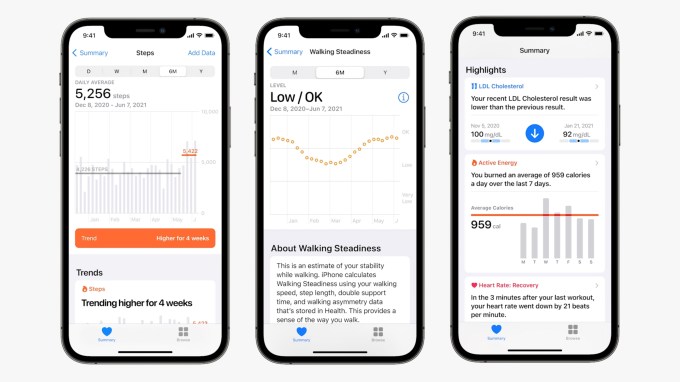| |
| Thanks to a twist of fate, two large cups of coffee and help from editor Annie Saunders, the Extra Crunch team is taking over today’s edition of Daily Crunch. Don’t worry, we’ll hand it back as soon as Henry Pickavet returns or Alex Wilhelm is back from vacation, whichever occurs first. Since I’ve been handed the mic: We’re trying to identify the most effective growth marketers who are helping startups build their businesses. With that in mind, Managing Editor Eric Eldon interviewed growth leader Susan Su, currently head of portfolio strategy at Sound Ventures, about the need for founders to develop a growth-centered mentality as the economy reopens. “They don't need to memorize all the right buttons to push in an ads dashboard, but they need to be familiar and comfortable with the core work of gap-finding,” says Su. “Founders will fail if they adopt a mentality that someone else can or should do it for them. The founder's job is to supply ambition and opinions, and then magnetize high-quality talent to come and pull the levers and bring their creative vision to life.” If you’ve worked with a growth expert you recommend, please get in touch and let us know. Thanks for reading! Walter Thompson Senior Editor, TechCrunch @yourprotagonist | |  Image Credits: Apple | | |
The TechCrunch Top 3 Apple doesn’t rank with top personal health brands like Procter & Gamble, Peloton or Fitbit, but perhaps it doesn’t need to. Cupertino’s health-related products and services are broad enough to touch each of these companies — and many others — in some way. In an interview with Apple VP of Technology Kevin Lynch, Darrell Etherington tracked the evolution of the company’s user-guided approach to developing hardware, software and data management policies around personal health. "It actually started from Apple Watch, where we were capturing heart rate data for calorimetry activity, and [Activity] ring closure, and we needed a place to put the heart rate data,” says Lynch. “So we created the Health app as a place to store the data." Sarah Perez reported on today’s launch of Spotify Greenroom, a live audio app based on the code of Locker Room. In March, Spotify purchased Betty Labs, which developed Locker Room. Best known for music streaming, Spotify has been branching out into a more robust media company in recent years. Greenroom will allow users to host and join audio chat rooms, “and optionally turn those conversations into podcasts,” says Sarah. There’s a reason why advertising units are called “impressions.” CPG companies are eager to literally place their messages in our faces. So it should come as no surprise that Facebook today announced its plans to start testing ads on its Oculus platform in a limited rollout. A company blog post indicates that "for now, this is a test with a few apps.” | | | |
| |
Startups and VC Software testing platform BrowserStack announced today that it has raised $200 million in a Series B round. The round, which values the company at $4 billion, was led by BOND, with Insight Partners and Accel participating. PandaDoc competitor Templafy has raised a Series D worth $60 million. Since launch, the business document creation platform based in Denmark has raised $125 million, including a $25 million Series C 14 months ago. After securing a $100 million Series E round led by Accel partners, last-mile delivery platform Bringg is now valued at $1 billion, the company confirms. CEO Guy Bloch told TechCrunch the funds will be used to continue fueling growth, expanding operations and acquiring new customers. "Companies need our urgent help to do a job,” says Bloch. | | | |
| The prevailing post-pandemic edtech narrative, which predicted higher ed would be DOA as soon as everyone got their vaccine and took off for a gap year, might not be quite true. Natasha Mascarenhas explores a new crop of edtech SaaS startups that function like guidance counselors, helping students with everything from study-abroad opportunities to swiping right on a captivating college (really!). “Startups that help students navigate institutional bureaucracy so they can get more value out of their educational experience may become a growing focus for investors as consumer demand for virtual personalized learning increases,” she writes. (Extra Crunch is our membership program, which helps founders and startup teams get ahead. You can sign up here.) Read More | |  Image Credits: Vertigo3d / Getty Images under a Vertigo3d license. | | |
Big Tech Inc. Facebook rolls out new tools for Group admins: Facebook launched a new set of tools aimed at helping Facebook Group administrators get a better handle on their online communities and, potentially, help keep conversations from going off the rails. (May the odds be ever in your favor!) Among the more interesting new tools is a machine-learning-powered feature that alerts admins to potentially unhealthy conversations taking place in their group. Another lets the admin slow the pace of a heated conversation by limiting how often group members can post. As the adage goes, if you can't say anything nice, say it slower. Google updates online safety curriculum for kids: Perhaps we can teach the next generation to just be nice on the internet instead of using machine learning to prevent them from rapidly disseminating vaccine disinformation? Google updated and expanded its digital safety and citizenship curriculum, Be Internet Awesome, which has lessons for parents and educators about online gaming, cyberbullying and online empathy. Fingers crossed! Waymo, Alphabet's self-driving arm, raises $2.5B: In its second outside funding round, Waymo raised $2.5 billion to grow Waymo Driver, its autonomous driving platform, and its team. At the moment, Waymo One, a commercial ride-hailing service, operates in the Phoenix, Arizona area, and Waymo announced plans earlier this month to enter a "test run" of its trucking and cargo transportation service with J.B. Hunt. | | | |
| |
Newest Jobs from Crunchboard | | | | |
| |
| |





No comments:
Post a Comment
Note: Only a member of this blog may post a comment.